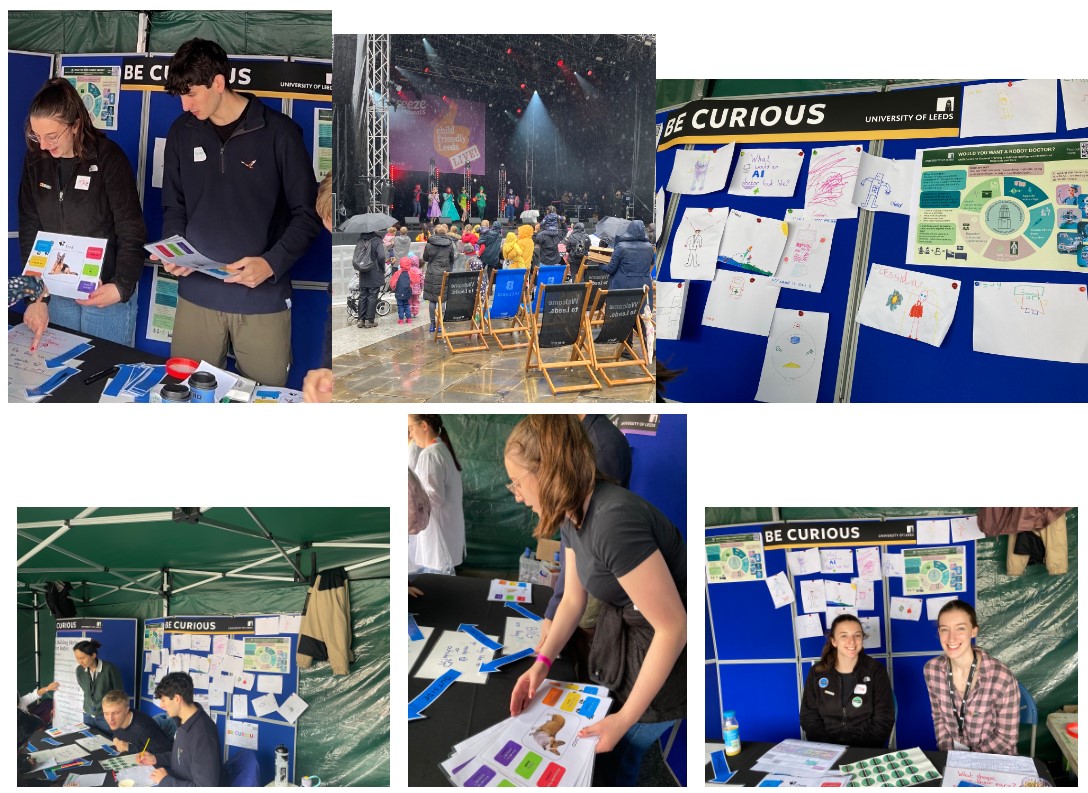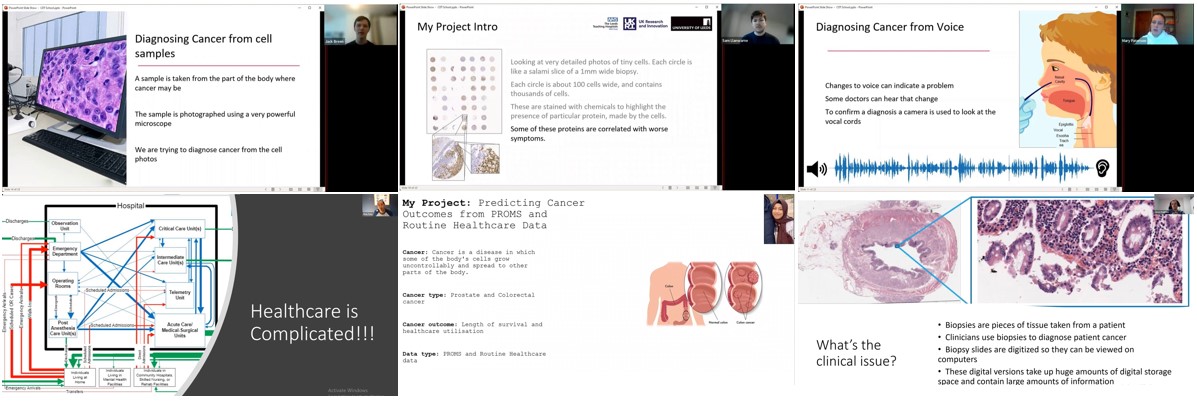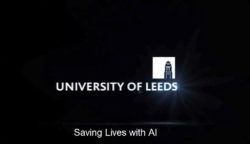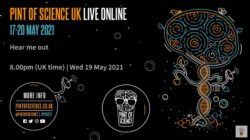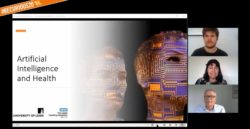Outreach & Public Engagement
In2Science Summer Placement

From 31 July till 5 August our CDT hosted 6 year 12 students for a summer placement through the In2Science programme to promote social mobility and diversity in STEM. We had a jam-packed schedule over the five days they were with us: meeting CDT students discussing their projects, joining CDT journal club and research discussions, getting insights into university application process, learning about AI in healthcare, familiarising with ethics and trustworthy AI, gaining practical programming skills using Python, and applying machine learning to predict patient outcomes. On Friday the students had a last chance to finish their projects before they presented at a mini conference attended by the CDT students and directors. Everyone we very impressed by the work they had completed in just a week and their understanding of machine learning methods and ethics. Read more on our CDT students’ blog.
Child Friendly Leeds Live
At the Child Friendly Leeds Live festival organised by Breeze, PhD students from our CDT, including Victoria Moglia, Morgan Thomas, Oliver Umney, Xin Ci Wong, Zoe Hancox, and Oliver Mills, met hundreds of children and their parents at stalls in the city’s Millennium Square. Their collective effort centred around running an engaging stall aimed at sparking children’s curiosity about the realm of artificial intelligence and its applications in healthcare. The festival was part of the Be Curious series of initiatives to show local communities what research is taking place and what impact it can have on people’s lives. Read more on the CDT students' blog and on the University of Leeds news.
Be Curious 2023
This year CDT students got the opportunity to show off some of our work at Be Curious. This is an event run by the university, which gives the opportunity for researchers to present their work to families. We hosted three different stalls all about the exciting work we do in medical AI. The first stall was all out how wearable sensors can be used to monitor patient health. The second stall allowed families to see how ultrasound could be used in diagnosis and have a go using a model of the throat. The third stall pitted families against an AI in guessing someone’s age based only on their speech. Our CDT students had a brilliant time showing off our research to the next generation of researchers!
Radiotherapy and Artificial Intelligence Dragons’ Den
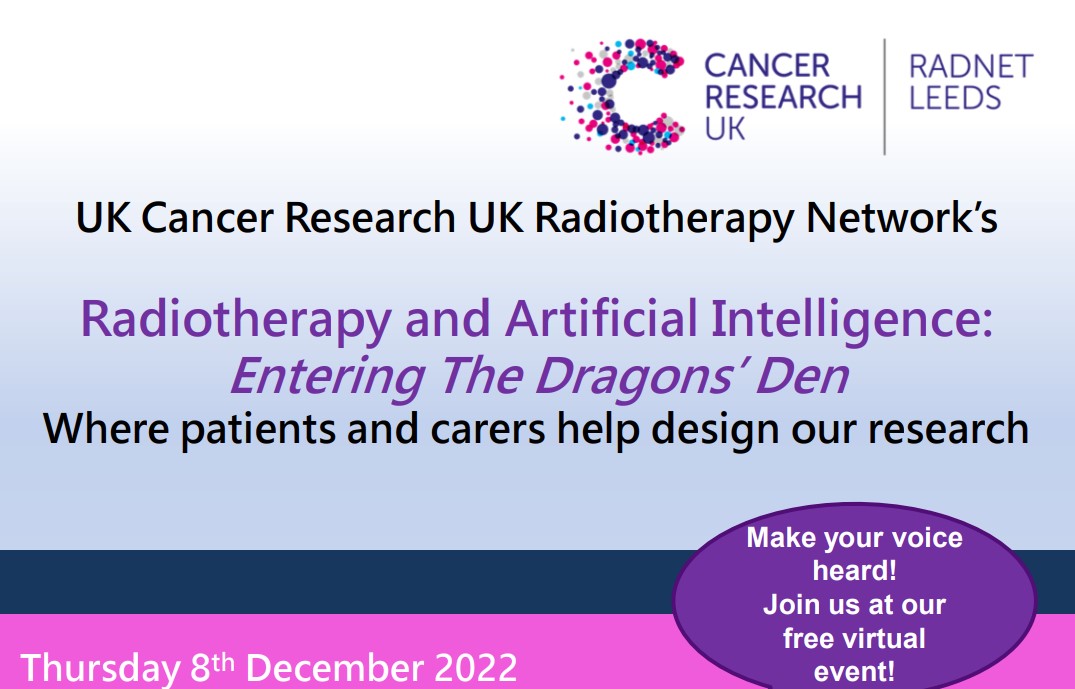
Three of our PhD students took part in a Patient Dragons’ Den organised by RadNet Leeds discussing their work with a panel of patients. Anna Grace Linton discussed “Can Artificial Intelligence and patient-reported experiences tell us more about cancer outcomes, looking at what patients write in the free-text boxes on surveys?” which provided an opportunity for patients to discuss and help shape a research project before it is sent for ethical approval. Alex Coles discussed “Could Artificial Intelligence and Patient Data help detect recurrence?” exploring a possible approach using patient data from Leeds Teaching Hospital Trusts. This gave an opportunity for patients to help design a research project in the early stages, and to help a researcher explain the concepts behind it. Shazeea Masud discussed “Can Artificial Intelligence, clinical data and patient-reported data be combined to help patients balance predicted length of life and likely quality of life?” which provided an opportunity to explore a research project addressing a challenge for many patients and their families.
Rumble Museum Breakfast Talks
Mary Paterson, Jack Breen, Sam Llanwarne, Siân Carey, Shazeea Masud, Alan Pang, Jason Keighley, Prof. David Hogg and Prof Vania Dimitrova delivered two online talks on Saving lives with AI at the Rumble Museum Breakfast Talks. The talk were advertised to all Year Eight students and parents of Cheney School in Oxford, a large comprehensive secondary school in a very diverse area. All events were offered to the school and its wider community in order to ensure the widest possible participation.
The Power of STEM CDT series – Saving lives with AI
The CDT is involved in developing 'The Power of STEM' series of workshops which are part of the academic programme of the Reach for Excellence. Reach for Excellence is the flagship widening participation scheme at the University of Leeds outreach. It supports and stretches students with the potential to gain a place at a research intensive university, but who may not have considered it (or who may perceive barriers to entry). Following the positive feedback from the session in the Summer, a series of sessions are being delivered in November 2021.
Our students - Joe Sims, Lucy Godson, Anna-Grace Linton, Sara Jones, Emma Briggs, Sian Carey, Victoria Moglia, Oli Umney and Aron Syversen - designed and presented online interactive workshops for year 12 students studying at least one STEM subject at A-levels. This was part of a larger inter-CDT outreach event.
Pint of Science
Lucy Godson helped co-ordinate and hosted one of the virtual Pint of Science nights for the University of Leeds, which was looking at how AI is being implemented in different healthcare settings and again it was really great to interact with an audience outside of the University about the AI research happening in Leeds.
Breaking Boundaries in STEM - AI for a fairer world

For Ada Lovelace Day 2020, we teamed up with Black History Month for a Breaking Boundaries in STEM event focused on AI and Fairness.
AI has huge potential to create new and exciting futures, but it could also be a terrible weapon. Will society be fairer or more unfair in the future and how can computer scientists help create a fairer world?
The event, which was open to everyone interested in applications and implications of AI and attracted some 100 people from Leeds and other universities, included: (i) watching an inspirational TED Talk on AI and fairness; and (ii) panel discussion addressing issues raised in the talk.
Our panellists included inspirational role models at different career stages and with different lived experiences. The panel discussed: (i) what we need to do to ensure AI creates a fairer world using a broad range of examples of applications of AI with a focus on Medicine and Health; and (ii) how we can attract researchers from diverse background to AI, discussing challenges and opportunities based on panellists’ experiences.
Be Curious 2020
Prof. David Hogg, Sam Llanwarne, Jason Keighley, Tom Allcock, and Prof. Vania Dimitrova presented at the University of Leeds Be Curious virtual festival. Be Curious is an interactive activity for the general public, aimed triggering curiosity and inspiring engagement in STEM.
Students' Blog
The blog is run by some of our CDT students and includes more detail of activities listed above.

